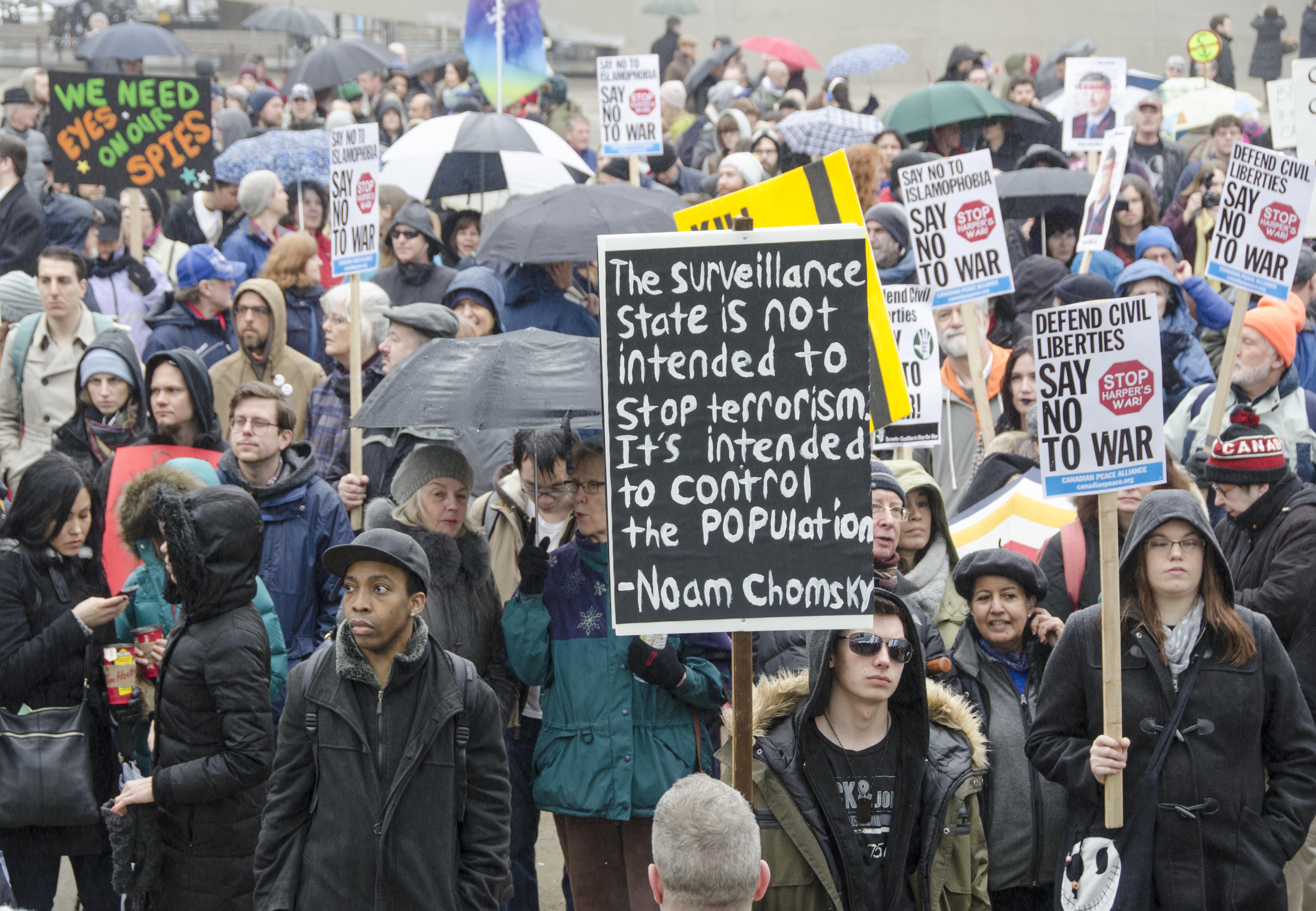Canada is currently undergoing a human rights crisis. The Liberal government is currently conducting public consultations over the “problematic elements” of the so-called anti-terror Bill C-51. However, this process is already set up to be rigged.
This three-part blog series will act as a response to the Liberal government’s rhetoric of amendments by highlighting the actual problematic elements of the Act. Ultimately, the Liberal government should repeal and replace the Act with national security measures that can be held accountable to our Charter rights to democratic participation, and privacy.
This series is meant to inform activists and concerned citizens about the dangers of unshackled national security law in a time where an atmosphere of fear overshadows our democratic rights.
Bill C-51 has been routinely called out by activists, journalists and legal scholars for empowering Canada’s government and security establishment with the ability to violate charter rights and domestic privacy. Intelligence and security agencies in Canada already have a history of abusing their powers. Under their new expanded powers, this abuse can only become more sharply focused.
We are given a unique opportunity to voice our concerns of our unbridled national security apparatus. We need to push for a national security platform that is mandated to respect human rights (domestically, and abroad) and held accountable to those standards. Before this, we need to understand some of the major human rights concerns that this legislation enables.
I will highlight two major concerns that are absent from the Green Papers: Big data surveillance and information sharing and the courts’ new role in sanctioning violations of the charter. However, these are two concerns only scratch the surface of this dangerous bill.
Big Data Surveillance and Information Sharing
We live in a world where surveillance is ubiquitous — it is built into many of our smart devices and embedded in all our communication platforms. C-51 allows for greater and more ambiguous data sharing between government agencies. Furthermore, the Green Paper, a guiding document for the National Security consultations, does not sufficiently address privacy issues in the digital age. In fact, it seemed to be calling for tougher digital surveillance laws to enable a stronger dragnet for collecting intelligence.
Canadians routinely have their telecommunications data intercepted and stored for intelligence research. There is such a large volume of data being streamed into servers and analyzed by secret computer algorithms that it’s been dubbed big data. This is a nebulous topic that has many issues. Among these issues is that CSIS and the CSE aren’t supposed to be spying on domestic folks without a warrant. However, while bulk data is being collected, many Canadian’s are unintentionally caught in the surveillance net. This is later shared with other federal agencies or shared with International partners (The Five Eyes).
The Security of Canada Information Sharing Act, among the many omnibus changes under Bill C-51, allow up to 100 different Federal agencies to share bulk data. According to Micheal Vonn, under this Act, surveillance is justified by activities that “undermine” Canadian security. Vonn asserts that this language is overbroad, allowing for potentially dangerous abuses. Vonn writes,
“The Act does not require individualized suspicion as a basis for information sharing amongst government agencies. There is no impediment in the Act to having entire databases shared with CSIS or the RCMP. The standard for ‘sharing’ is very, very low.”
So low, that CSIS and the CSE have been collecting illegal data all along.
Violations of the Canadian Charter of Rights and Freedoms
In their book, False Security: The Radicalization of Canadian Anti-Terrorism, Craig Forcese and Kent Roach discuss the terrifying consequences of the court role reversal under Bill C-51. The role of the courts has traditionally been to uphold the Canadian Charter of Rights and Freedoms. After C-51 passed, the courts were mandated to authorize warrants to CSIS that directly undermine the Charter.
Further, the warrant given to CSIS is made to be secret so as to not expose their investigation or informants to outsiders. This makes sense in its context. However, it sets the foundations for more abuses. Forcese and Roach argue that “judges risk becoming enablers of illegality.”
In my last blog post, I explored how CSIS and the RCMP have traditionally targeted activists who pose a threat to the established order. There is little oversight or accountability built into these laws to hold the state accountable to following the original mandate of anti-terrorism. Furthermore, it is left up to CSIS to decide whether or not the violations of Charter rights are proportional to the threat they are concerned over.
Vonn notes that CSIS is being transformed into a secret police force able to disrupt activities that they perceive and justify as a “threat” based upon an overbroad criterion. The government will argue that CSIS is not able to police. However, Vonn notes that there is significant debate in the legal community concerning the interpretation of CSIS’s expanded powers.
The Anti-terrorism Act has set the stage for Canada’s descent into dangerous and legally sanctioned violations of human rights that are supposed to be guaranteed by the Charter. This legislation also threatens our international obligations, the International Covenant on Civil and Political Rights (ICCPR), to uphold standards of human rights domestically and abroad.
Part one of this series discussed the problematic history of national security in Canada. Part three will look at the problematic elements of the consultation process itself, why it appears to be a stalling technique and why C-51 should be fully repealed.



